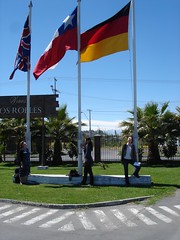I recently came across an article on The Huffington post about proposed changes to WTO regulations about how a product is labeled. If the changes are made, country of origin will no longer be printed on tags, but will instead say "Made in the World". It is really disturbing how much unregulated power the WTO has to change trade/labeling rules. According to the WTO, "This new database allows trade analysts to have a better view of the global value chains created by world trade. These added-value chains have become an essential feature of our economic reality as trade is becoming increasingly globalized and today’s traded products are not produced in a single location but are the end-result of a series of steps carried out in many countries around the world."
If the new labeling changes took place, there would be even fewer barriers to companies putting exploitative factories in place. There would also be less accountability for companies, who could easily skirt certain regulations and rules. By not placing a country of origin, and no other explanatory labeling or oversight, we open ourselves up to harmful products. "This Initiative could have dire consequences for America's manufacturers and consumers. For manufacturers, it could eliminate one of the options allowed by the WTO -- filing a charge for product "dumping" against another country to have countervailing duties applied against that country. For consumers, "Made in the World" labels wouldn't allow you to protect your family from the tainted, harmful, and even life threatening products coming from China. You wouldn't be able to support saving and creating jobs for other Americans by buying 'Made in the USA'. "
I would be most concerned about the lack of oversight about products made harmfully, either for the producers, the consumer, or the planet. If a product has a "Made in the World" label, we can have no way of knowing if a product was hammered together outside of a nuclear waste factory then painted with lead paints in China. I am exaggerating, but I fear the reality might not be far off. If certain modes of production are cheaper from one country to the next, companies will gladly and quickly move them accordingly. And these are concerns for consumers in the US and other countries.

The Huffington Post article focuses on the harms this new system would have on Americans, but what about the artisans and producers we rely on for our commodities? They are the most vulnerable population, and should be considered. Americans have more freedom and opportunity than most to educate themselves about their products, where they come from, and to make decisions on which product to buy -- for example, purchasing a fair trade scarf rather than one from Walmart.
Globalization is changing business models and increasing fragmentation of production. Companies divide their operations around the world, from product design, manufacturing, to assembly and marketing, creating global production chains. More and more products are "made in the world" rather than in any particular country. Today's traded products are not produced in a single location but are the end-result of a series of steps carried out in many countries around the world. For example, cars and trucks produced by General Motors or Ford may have parts and assemblies coming from several other countries, including China.
The above quote is absolutely true. Most products that you buy in stores are made in several different countries, so the company can maximize profit by moving the production line across country borders for the cheapest mode of production. The new label would encourage this even more, since companies would not be hindered by customs labels or rules.
However there are organizations that aim to preserve the production chain and keep things transparent, which is a solid tenant of Fair Trade organizations and agencies. One in particular is called The Fair Tracing Project, which aims to "support Ethical Trade by implementing IT Tracking and Tracing Technologies in supply chains to provide consumers and producers with enhanced information. Digital tracing technology enables each individual product to be both given a unique identity and tracked throughout the value chain from producer to consumer. The information that may be attached to such a “tagged” product is virtually limitless, beginning with details of the product’s date and cost of creation, as well as its individual creator and his/her working environment and pay, through the various steps of its transport to the eventual point-of-sale to the consumer."
Fair Trade Proof Index is another organization committed to a transparent production line, and have set a up a system for every consumer to trace their coffee!
Keeping oneself educated is one of the most important things we can do, especially if that education informs our shopping decisions. The power of the almighty dollar is strong! Continue to support those companies whose values align with yours, and who keep producers in mind when creating new products.
This is an interesting topic, and we welcome your opinion! Drop us a comment here, or on our facebook page!
Also, make sure to support the Northwest Fair Trade Coalition's Fair Trade Directory, to make sure that supporting fair trade in Portland is as easy as can be! Our goal is for fair trade to be as accessible as possible for all members of our community!



No comments:
Post a Comment